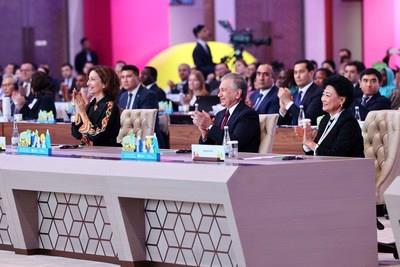(MENAFN- PR Newswire) TASHKENT, Uzbekistan, Nov. 21, 2022 /PRNewswire/ -- On the last day of the World Conference on Early Childhood Care and Education held in the capital of Uzbekistan on 14-16 November, representatives of about 150 countries adopted the Tashkent Declaration of UNESCO. This information was provided by the Ministry of Preschool Education of the Republic of Uzbekistan.
Earlier, speaking with a welcoming speech to the delegates of the conference, the President of Uzbekistan Shavkat Mirziyoyev said:
continue reading

UNESCO Director-General Audrey Azoulay (L), President of Uzbekistan Shavkat Mirziyoyev (C) and other participants in the World Conference on Early Childhood Care and Education held in Tashkent on 14-16 November, 2022.
'I am confident that today's conference will be held in the spirit of frank discussions and exchange of views, new ideas and initiatives, and that specific proposals and recommendations will be developed. Undoubtedly, the Tashkent Declaration, which will be adopted at the conclusion of the conference, will serve as the basis for our joint efforts in this direction.'
The Tashkent Declaration is intended to set the international agenda for early childhood education through the year 2030. This document has been prepared through a consultative process during the conference and, once signed, will be translated into the six official languages of the United Nations and shared with the UNESCO Member States.
'In Uzbekistan, we have the opportunity to send a powerful message to the world based on UNESCO's commitment to make 2022 the year of mobilization of efforts for education. Here in Tashkent, we must determine the model of society we want to live in – a society that takes care of its children, guiding them and giving them all the attention they deserve,'
said UNESCO Director-General Audrey Azoulay.
In the framework of the strategy for global transformation of early childhood care and education (ECCE) system, the Tashkent Declaration established a set of guiding principles: improving the quality and relevance of curricula and pedagogy; ensuring equal and inclusive educational services for all children, and protecting and guaranteeing the rights to access ECCE in emergency situations. These and a number of other tasks are based on such fundamental factors as the development and support of teachers, broad introduction of innovations and state support for the sphere. The provisions of the UNESCO Tashkent Declaration, which set the main vectors for development of ECCE until 2030 – a milestone for the UN Sustainable Development Goals – since the moment of signing become a guide for international organizations and relevant ministries of the countries participating in the world community in implementation of the paragraph 4.2 which reads:
'By 2030 to ensure that all young girls and boys have access to quality early childhood development, care and pre-school education systems so that they will be ready for primary education.'
SOURCE Ministry of Preschool Education of the Republic of Uzbekistan
MENAFN21112022003732001241ID1105215612
Legal Disclaimer:
MENAFN provides the information “as is” without warranty of any kind. We do not accept any responsibility or liability for the accuracy, content, images, videos, licenses, completeness, legality, or reliability of the information contained in this article. If you have any complaints or copyright issues related to this article, kindly contact the provider above.